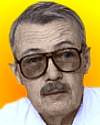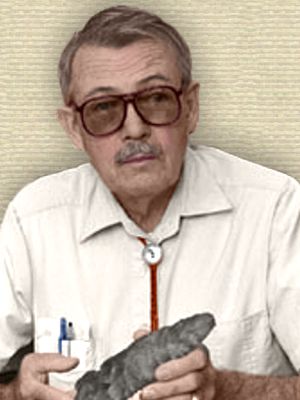 (source)
(source)
|
Vance Haynes
(29 Feb 1928 - )
American archeologist and geologist whose interests include the peopling of the New World, geochronology of global climatic change, radiocarbon dating, history of exploration of the eastern Sahara, and American Indian wars in the West from 1865 to 1898.
|
Science Quotes by Vance Haynes (7 quotes)
[The ancient Clovis people] had the same gray matter as you or me. They were at a different stage in their technology, that’s all.
— Vance Haynes
As quoted in Sharman Apt Russell, When the Land Was Young: Reflections on American Archaeology (2001), 62.
[To identify ancient sites] The primary requirement is a human skeleton or artifacts that are clearly the work of humans. Next, this evidence must lie in situ within undisturbed geological deposits. The artifacts should be directly associated with stratigraphy. Finally, the minimum age of the site must be determined by a direct link with fossils of known age or with material that has been reliably dated.
— Vance Haynes
As quoted in Sharman Apt Russell, When the Land Was Young: Reflections on American Archaeology (2001), 22.
For me and many scientists, the understanding of nature is based upon scientific investigations that add to humankind’s ever increasing fund of knowledge. The fund is ever changing as new generations of scientists add to, debate, and reinterpret the data.
— Vance Haynes
From 'Mystery of the First Americans: Claims for the Remains: C. Vance Haynes, Jr.', web page on pbs.org website.
For those who have devoted their lives to better understanding the peopling of the New World, the Kennewick find is a rare opportunity for a significant increase in knowledge about who the early Americans were and how they relate to living tribes.
— Vance Haynes
From 'Mystery of the First Americans: Claims for the Remains: C. Vance Haynes, Jr.', web page on pbs.org website.
Geological strata are like pages in the book of time and need to be read by qualified experts to learn what happened at the Kennewick find site.
— Vance Haynes
From 'Mystery of the First Americans: Claims for the Remains: C. Vance Haynes, Jr.', web page on pbs.org website.
How often natural processes produce objects mistaken for the work of humans.
— Vance Haynes
As quoted in Sharman Apt Russell, When the Land Was Young: Reflections on American Archaeology (2001), 23. Russell adds that Haynes coined the term “geofact” to describe such objects. [To distinguish from a valid “artifact❞. -Webmaster]
Our knowledge regarding this important and fascinating question [about Kennewick Man] is based upon the scientific study of less than a dozen specimens found over the last 100 years. Furthermore, most of the specimens over 8,000 years old are either poorly preserved or are subadults and, therefore, much less informative than well preserved specimens.
— Vance Haynes
From 'Mystery of the First Americans: Claims for the Remains: C. Vance Haynes, Jr.', web page on pbs.org website.
See also:
- 29 Feb - short biography, births, deaths and events on date of Haynes's birth.
- Skull Wars: Kennewick Man, Archaeology, And The Battle For Native American Identity, by David Hurst Thomas and Vine Deloria Jr. - book suggestion.
- Booklist for Kennewick Man.

![Vance Haynes quote: [The ancient Clovis people] had the same gray matter as you or me. They were at a different stage in their t](https://todayinsci.com/H/Haynes_Vance/HaynesVance-GrayMatter500x250px.jpg)
![Vance Haynes quote: [The ancient Clovis people] had the same gray matter as you or me. They were at a different stage in their t](https://todayinsci.com/H/Haynes_Vance/HaynesVance-GrayMatterThm.jpg)
 In science it often happens that scientists say, 'You know that's a really good argument; my position is mistaken,' and then they would actually change their minds and you never hear that old view from them again. They really do it. It doesn't happen as often as it should, because scientists are human and change is sometimes painful. But it happens every day. I cannot recall the last time something like that happened in politics or religion.
(1987) --
In science it often happens that scientists say, 'You know that's a really good argument; my position is mistaken,' and then they would actually change their minds and you never hear that old view from them again. They really do it. It doesn't happen as often as it should, because scientists are human and change is sometimes painful. But it happens every day. I cannot recall the last time something like that happened in politics or religion.
(1987) -- 


